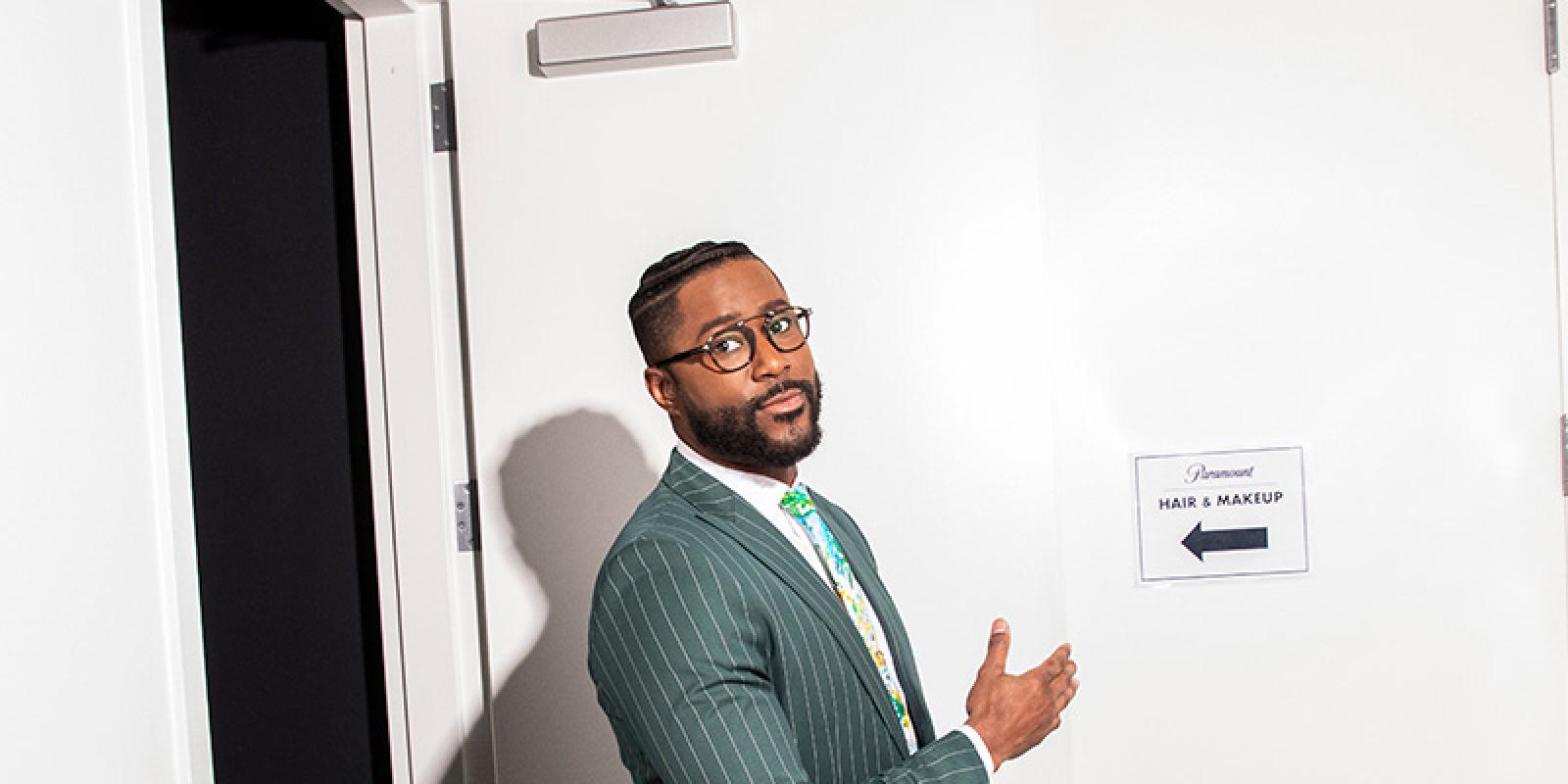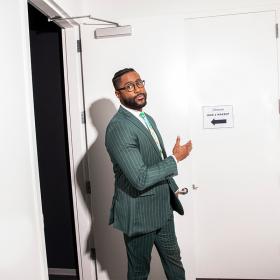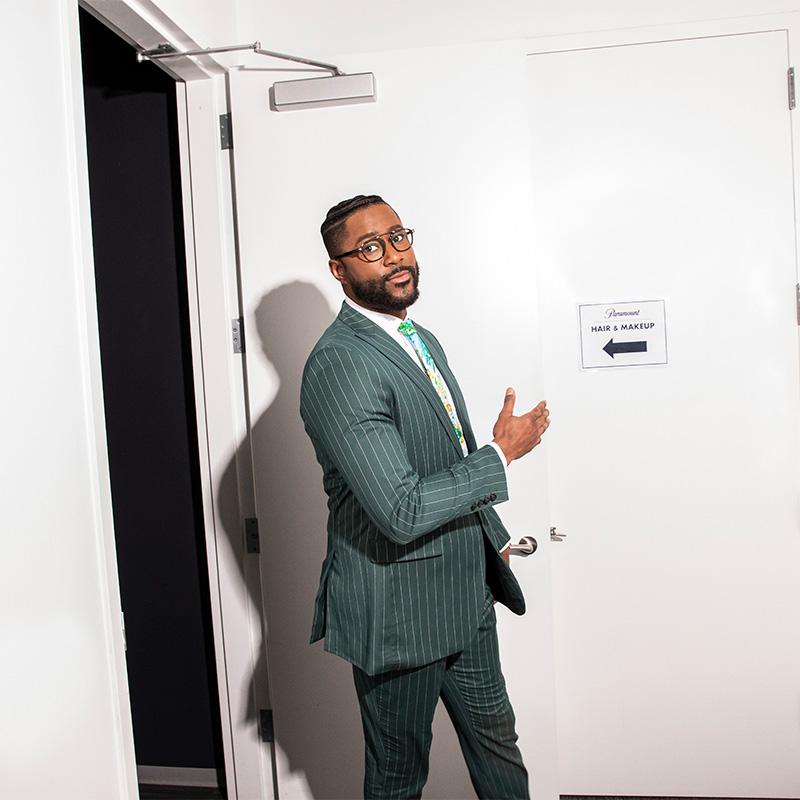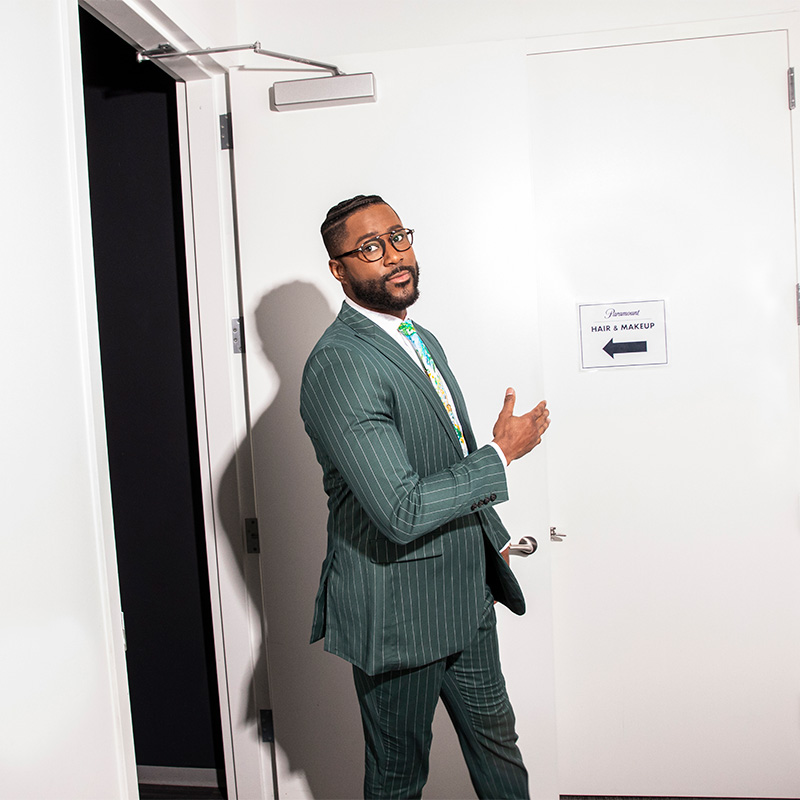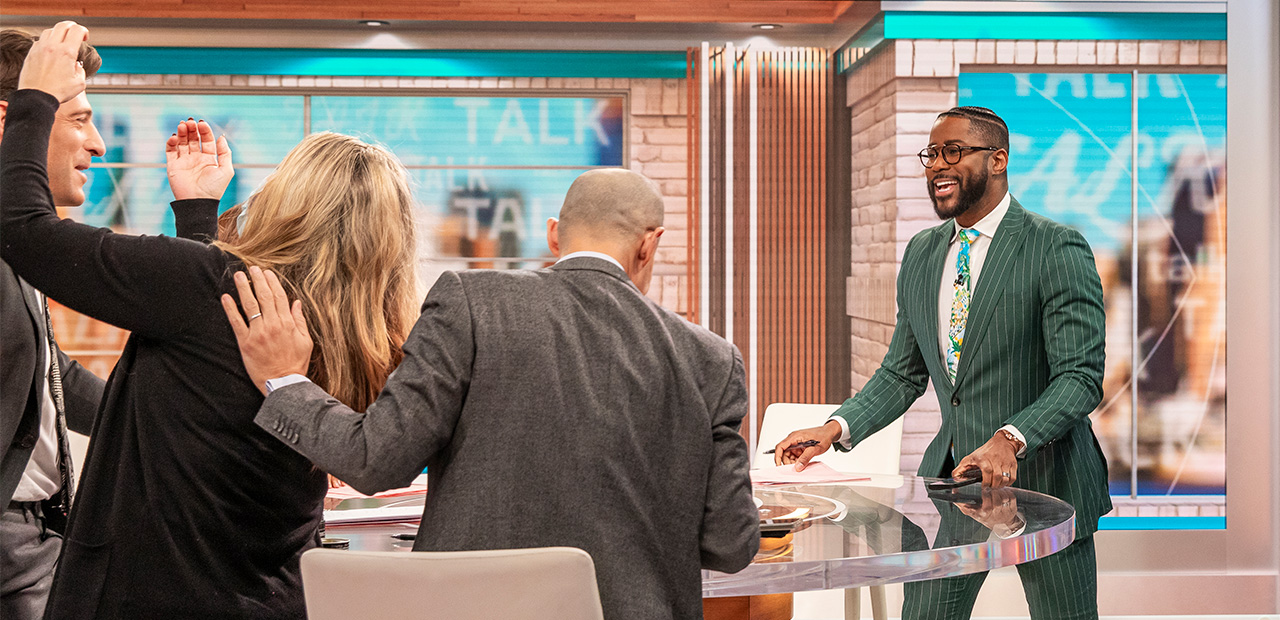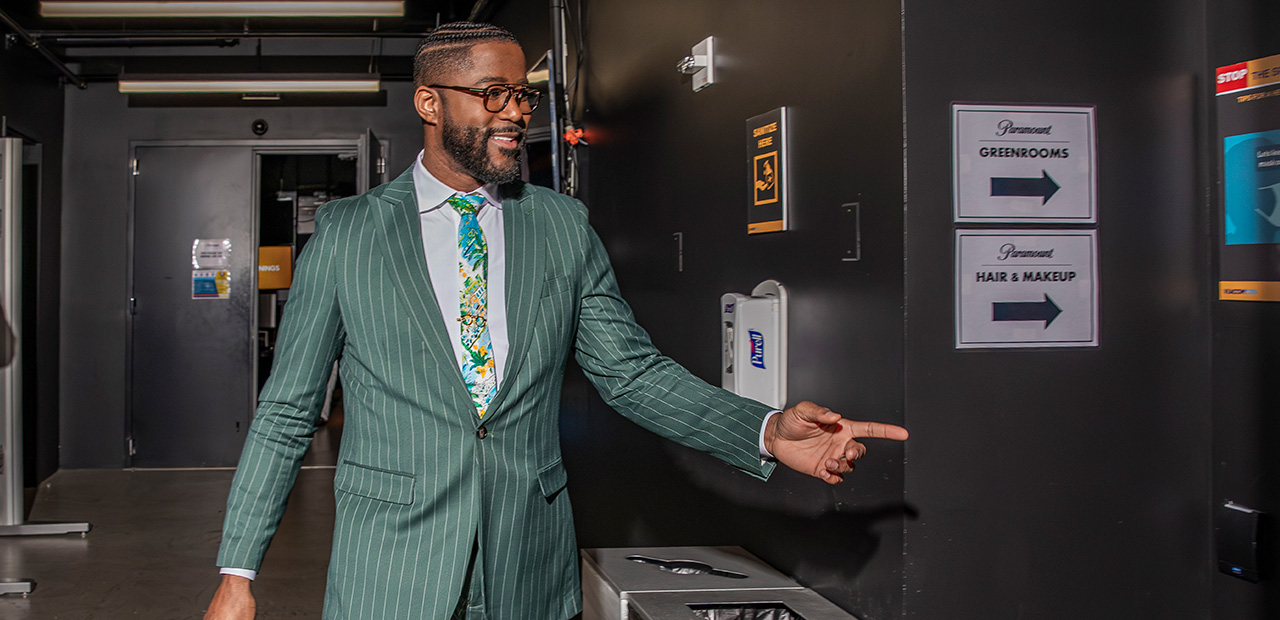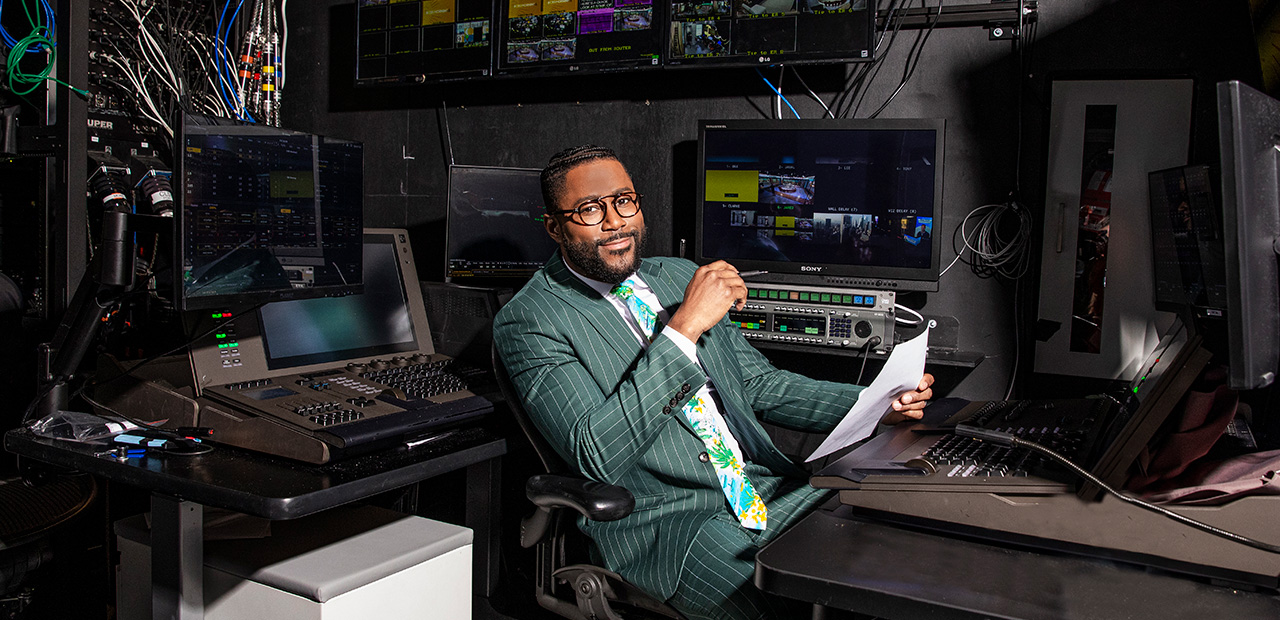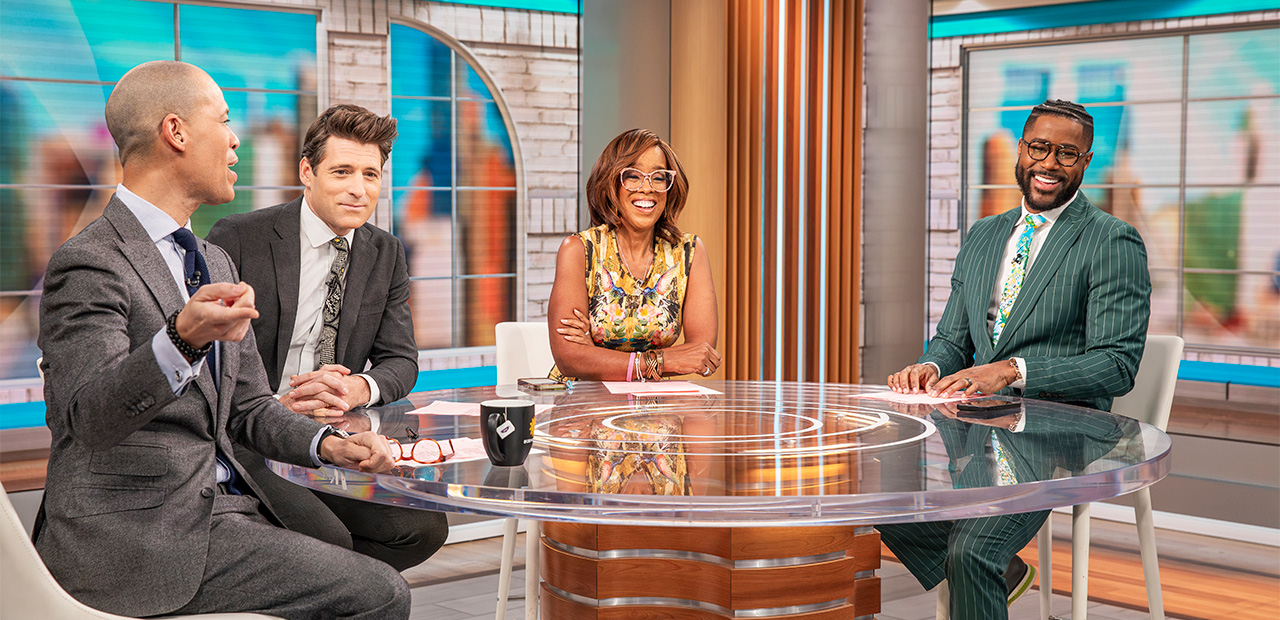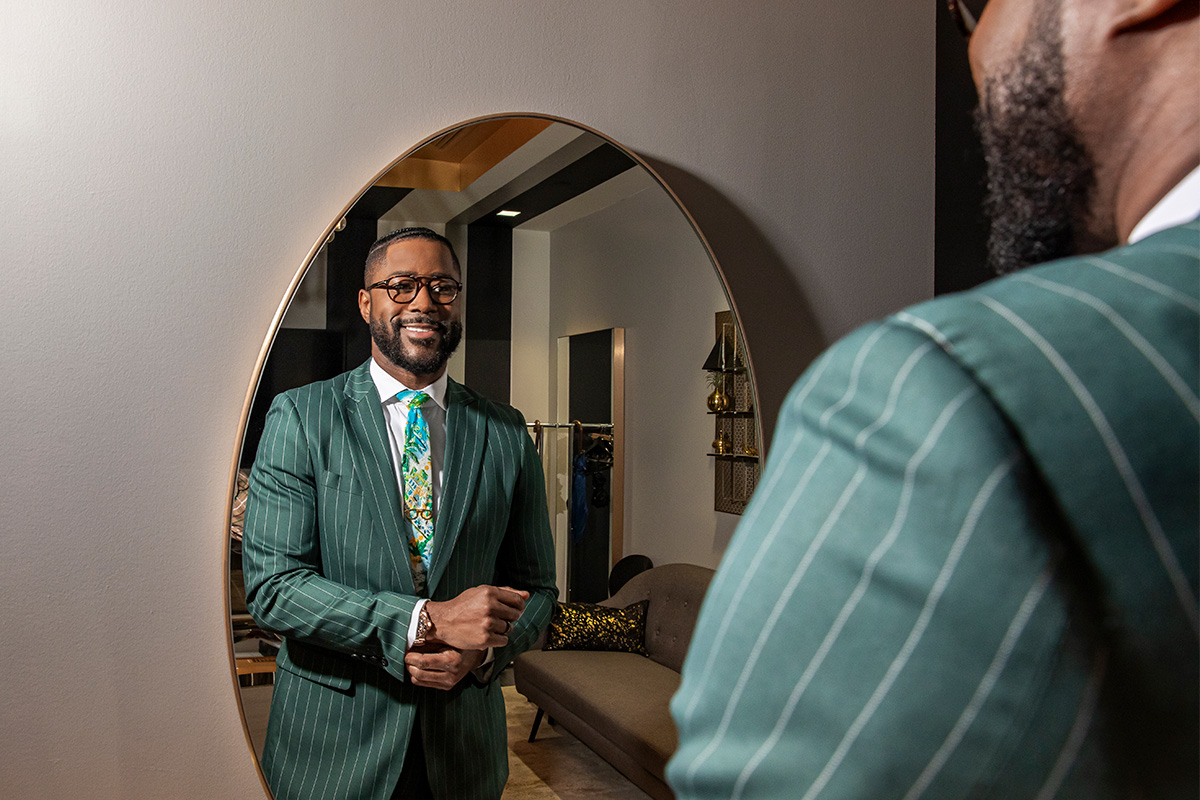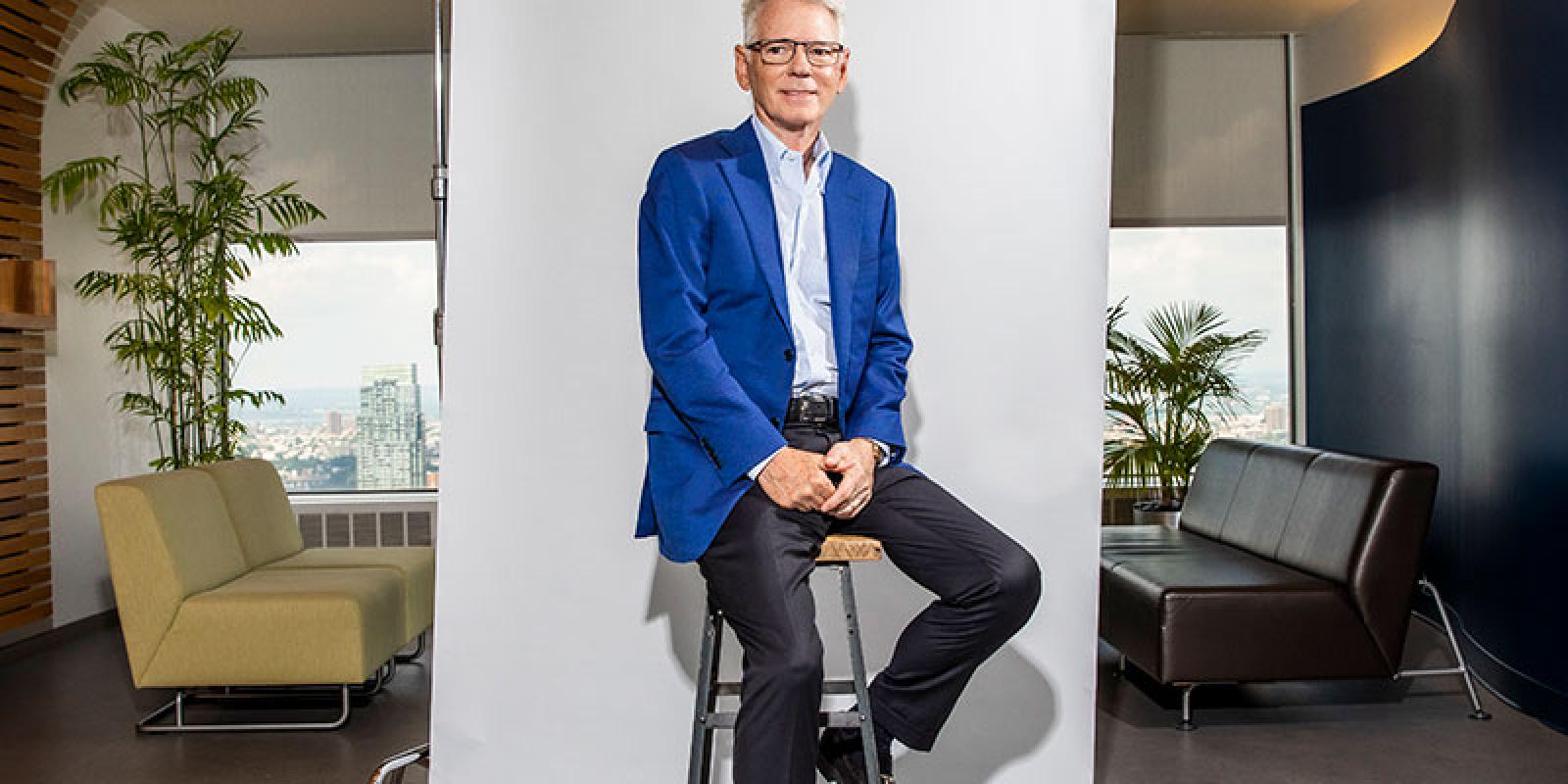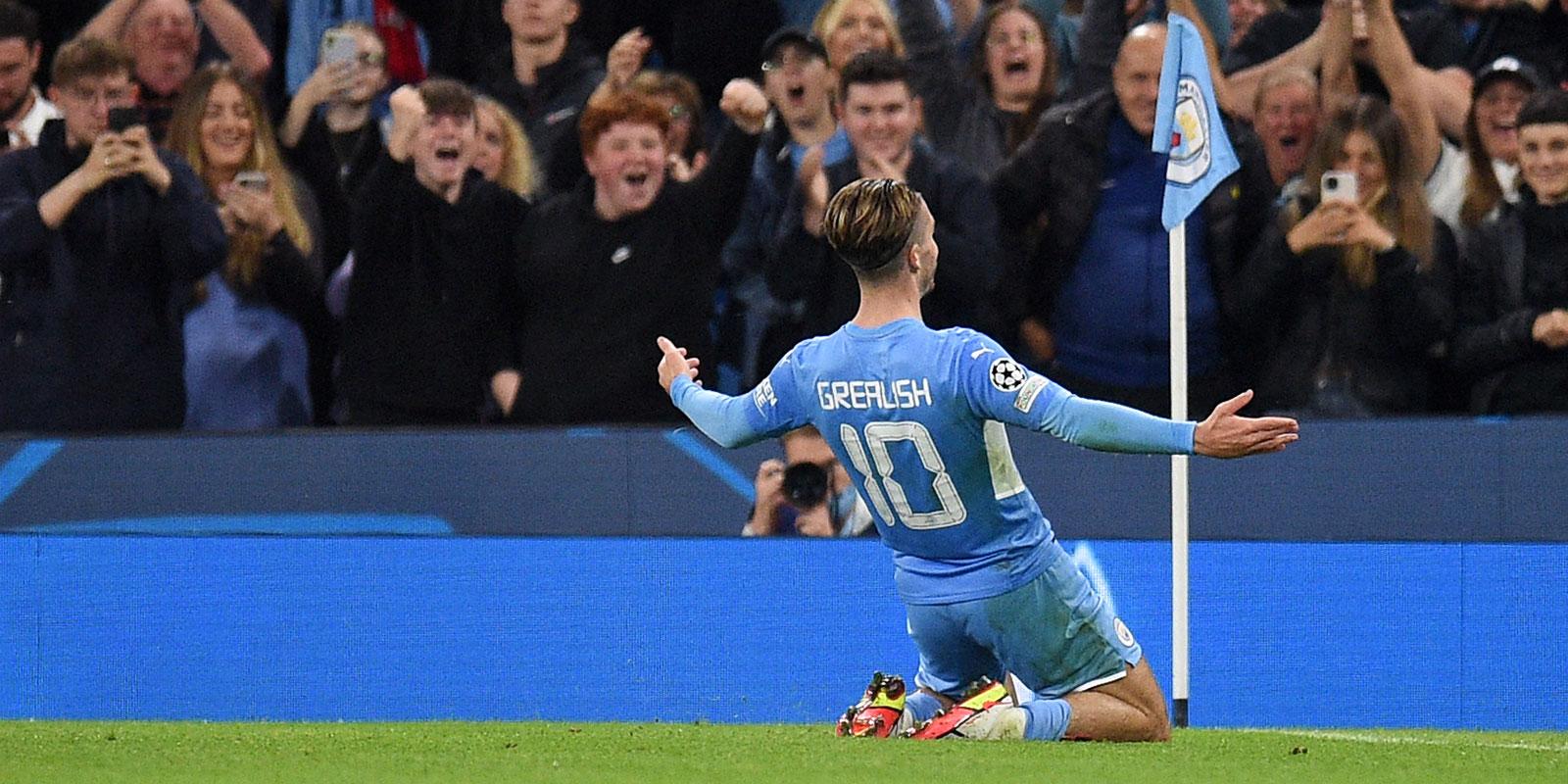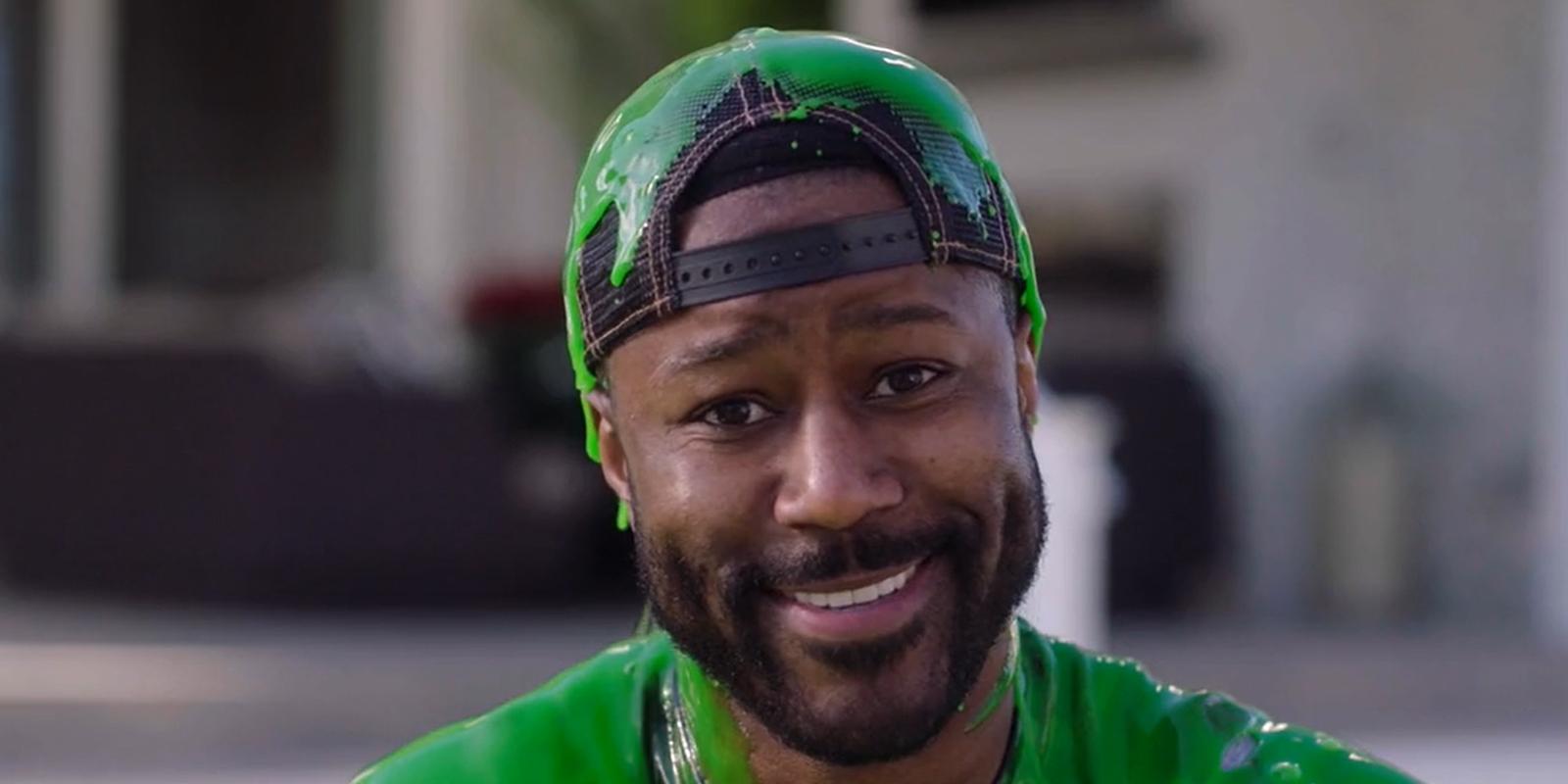JAN. 26, 2024
By Nicole Bitette
Photos by David Williams
Our In The Studio With... series, gives talent at Paramount the opportunity to reveal a little bit about who they are, their gigs at Paramount, and what drives them in the day-to-day.
Nate Burleson’s journey to the Super Bowl is slightly different from that of most athletes. Throughout Super Bowl week, Burleson will be bouncing around for his many roles at Paramount with CBS Mornings, The NFL Today, and Nickelodeon. And he’s immensely grateful for the opportunity.
“It will be the hardest week of my life from a working perspective, but it's also something that no other talent has ever done: A morning news show that leads into the NFL pregame and then in the booth for a kids’ show with the Nickelodeon telecast,” says Burleson. “I fought so long to make it to a Super Bowl as an athlete, and here I am, retired, and I feel like my own MVP of the game when it comes to the media. And this version of me being involved in the Super Bowl is much cooler.”
Burleson is a huge part of Paramount and CBS’ journey to the peak in Las Vegas for Super Bowl week, but beyond that, he wears numerous hats across the company, including his co-hosting spot on CBS Mornings, which he began in Sept. 2021.
“It is powerful for somebody to decide that they are going to spend a morning with us. I think about that every single day I walk through these doors,” he says.
Burleson spoke to the Newsroom about how he made the transition from football to news, the preparation that goes into each morning, and prioritizing mental health with a busy workload.
Q: Tell me a little bit about your sports background and how it led you to becoming an NFL analyst and now hosting a news show.
NB: When I was drafted in 2003, I would visit different networks in the off-season and pay my own way to rub shoulders with the right people. When I went back home to Seattle, I would work with our local news stations, and I worked with the media department of every team that I was on.
For me, that was sharpening my tools. Then, near the end of my career, they put on a broadcast boot camp, which allows applicants to put their name and brand out for the NFL to look at us. Out of a thousand applicants, 40 guys were selected. That year, I was a standout. I say that because many people patted me on the back and said, “Hey, you have a chance to work in media when you're done.”
When I decided to retire, I was running a restaurant, and a couple of clothing lines, writing poetry, and helping the athletes invest money. I had to focus. I didn't want to be good at a bunch of things. I wanted to be really good at one thing, and I locked in on TV.
I love the game, but I did not want to go back to play or coach. I put all my eggs in the basket of media, and the NFL Network allowed me to display more of my personality than other networks. I was able to flex certain muscles and show my creativity.
Q: In addition to The NFL Today, can you talk about the CBS Mornings crew going to the Super Bowl?
NB: It's pretty cool. Me, Gayle, Tony, we’re going to be live in Vegas (so yes, I have to be up even earlier). I've already committed to zero parties and maximum sleep. CBS Mornings will have a presence all week long with every branch of the CBS and Paramount tree. We will have access to the biggest acts and names, the celebrities and influencers, and the athletes who will be there for the Super Bowl.
Then we get to hand the baton to The NFL Today and we just take off from there with all the news, analysis, opinions and storylines surrounding the game. Four-hour pre-game show, halftime, postgame show. I turn around, wake up, and do another hit.
Q: Can you break down your involvement in the Super Bowl?
NB: It's going to be great for Paramount and exciting for me. It will be the hardest week of my life from a working perspective, but it's also something that no other talent has ever done: A morning news show that leads into the NFL pregame and then in the booth for the Nickelodeon telecast. Then I come back at halftime with the big dogs – JB, Phil, Coach, Boomer and JJ – go back to finish the game with the Nickelodeon crew, Superman it back up with the suit to do the post-game, and then wake up and do the news on Monday.
Q: How are you involved in the slime-filled Super Bowl telecast on Nickelodeon?
NB: The Super Bowl, for the first time, is taking place in Bikini Bottom. I am the commentator in the booth, so I'll be running from one booth to the other during the game. It's a lot of work, but it's an honor to have that type of workload across the CBS and Paramount family. It’s dope they want me to be part of our Super Bowl coverage in so many ways.
Q: As a former NFL player, what’s it like to be going to the Super Bowl in this capacity?
NB: I fought so long to make it to a Super Bowl as an athlete, and here I am, retired, and I feel like my own MVP of the game when it comes to the media. I don't want to make it about me, but I do feel thankful for being part of the CBS Mornings family, The NFL Today crew, and Nickelodeon’s NFL Slimetime. I'll have such a significant presence in a game that I fought so hard to be a part of. And this version of me being involved in the Super Bowl is much cooler.
![]()
The creativity of our internal team and licensing partners never ceases to impress... sometimes products come along that you’d never expect.”
Q: Not everyone is making the transition from the NFL to TV. Some people do the analyst route, but not many are going into news. How did you learn and prepare yourself to take a more journalistic approach, where you're covering more complex topics?
NB: I was able to sprinkle some of that in when I was working at the NFL Network. When there were stories that landed outside the realm of sports, I was the first to offer up my services. If there was a tough topic or an issue that was going on in the NFL, I wanted to do the interview or the sit-down. I was flexing these muscles.
The things that I'm thinking about are societal issues and who our political leaders are. All these interests that I have come on display when I show up on the set. That's the life I live. I don't go home and talk football. I go home and talk about everything we discuss on the show.
Q: What’s the most challenging part of your transition to news?
NB: The more difficult thing is proving to people that I'm much more than an athlete. I don't want to be the token Black guy or the token athlete, but I understand the perception. There are people who have worked for that seat and deserve that seat, in and outside of this building. So, I'm hyper-aware of that. If people are assuming that I can't swim in these spaces or there are other people who deserve this seat, which is true, there's no way I can show up and not know what I'm doing.
The toughest part is continually earning the trust of the viewers and the trust of the people who work in this building. And for me, that's my way of respecting the seat versus walking in and feeling like I deserve it. I've never had that approach to football, and I won't have it when it comes to any job I have after this. There's a humble yet hungry approach to what I do daily.
Q: In an Essence profile, you mentioned that mindset almost prevented you from taking the job. What made you take the risk?
NB: There was some hesitation, for sure. I was juggling three jobs while trying to be an active husband, father, and coach for my boys, who were playing little league and high school football. As much as I appreciated the offer, I just kept thinking to myself, how could I make this work? That was my only concern was having enough time, not just for my family, but also for this job. It would have been easy to take the job and not care what the results would be, but I was so worried about not holding up the bar at CBS.
CBS is the Tiffany network, whether it's sports or journalism. We have an integrity here that runs through everything. As I was transitioning out of talking about football every single day, I wanted to do more things that left an impact on people. Football was great for what it was.
When somebody walks up to me and tells me about my career, they'll either tell me I helped them win a fantasy league or I got hurt when I was helping them win a fantasy league. Not that that's not important to that young kid or adult, but it doesn't compare to someone who comes up to me and compliments me on the poem I wrote about mental health or my coverage of the midterms in Atlanta, or the conversation I had with Berry Gordo about Motown or when Barack Obama opened up about how he should have given his wife more credit while he was in office. Those conversations mean so much more than somebody telling me how athletic I was. Many people within the CBS family were very convincing, and Gayle was a large part of that. Gayle looked at me and said, “We can continue to build something special." And as you get more comfortable in this role, you can create some value for this show.
There's a reason we are so passionate on a daily basis. We show up every day and give it everything we have, because we feel like the people deserve that. It is powerful for somebody to decide that they are going to spend a morning with us. I think about that every single day I walk through these doors.
Q: The headline of that Essence piece called you “The Hardest Working Man in Media” — what do you make of that distinction?
NB: I won't say it, but I appreciate someone recognizing the work. These days are long, and nights are short. 4 a.m. never comes around on time. But it's worth it. This is the most fulfilling job I've ever had, which is shocking because people were like, “Bro, you scored touchdowns, and you had 70,000 people jumping up on their feet.” That was a rockstar lifestyle. It doesn't compare to waking up every day and opening a window up to the viewer and showing them what history has been made, what is being made, and what is potentially going to happen in the future.
I oftentimes just put my head down and work, and even my wife has to remind me to pick my head up and smell the flowers. Enjoy the fruits of your labor.
Q: Is there recognition you are searching for in this phase of your career?
NB: In football, we chase trophies, and it's a collective effort. I missed out on every sports trophy. I never won a championship in high school or college. In the NFL, I never got close to a Super Bowl. So, when I left, I didn't realize there was a void there, like most athletes who never went. One day I woke up, and I shook off the self-pity I had, and I looked in the mirror and said, “Go get other trophies.” Emmys are important because they're based on the collective efforts of everybody in front of and behind the camera, the machine that moves the show with Paramount and CBS. At the core of it, your compassion and your intellect are the ultimate reward. If I did win a Super Bowl and I were to compare the two, I would hold an Emmy more near and dear to my heart than a Lombardi Trophy.
Q: Describe your relationship with your co-hosts and crew.
NB: We’re like a family here at CBS Mornings. If you just came and watched us and saw what happens between the takes and during the commercial breaks, you’ll see it’s like hanging out with your closest friends or family members.
Q: You work every morning with Gayle King, a seasoned veteran. Has she taught you anything that has helped you in this role?
NB: Gayle has always been in my corner. What I've learned from her is that you should never let that childlike curiosity escape you because that's what drives us as journalists.
Also, the way she prepares. When we were going through the strike, we had many authors come on the show, and you might walk into your office on a Friday, and there'd be seven books there. On my Saturday day off, I’d get through as many books as possible and I feel somewhat accomplished. I’d write a few notes, highlight a few things, and have some good questions. Then I show up and Gayle has a thousand sticky notes in the book, pages of handwritten notes. And that right there, puts a lot of things in perspective. One, there's no surprise she's as successful and as respected as she is. But two, how in the world could I not give all the effort that I can to prepare for a five-minute interview? People may say, well, it's a five-minute interview, why would you be reading the whole book? Why not just play it off? Because I'd be disrespectful to my teammates when they are working their butts off and trying to prepare for a show. What I've learned from Gayle is hard work always wins.
As an athlete, you learn from those around you who are really good. You follow their lead. I'm constantly learning from them.
Q: How do you prioritize and focus on your mental health when waking up at 4 a.m. and having so many other roles?
NB: When I first moved to New York, I was so desperate for people to see me as more than just an athlete. I was saying yes to too many things, and I was spread too thin. I remember losing my facial hair. A dermatologist asked me what was different in my life. I told her I was waking up at 4 a.m. and had a few jobs while trying to be the best husband, dad, and coach. She immediately told me I was stressed out, and I said “No, I used to play football and get chased by 250-pound guys, and THAT’s stressful.” She told me that as I was explaining football, I was smiling and when I was talking about all my other jobs, I wasn’t and that I needed to figure out how to balance my life better.
I had to figure out how to balance my life in a healthier way that allowed me to be the best version of myself on TV. That meant plugging into my wife and my kids and making sure that when I was home, I wasn't working. It took a while to figure out balance because it could be self-destructive if you don't. Working is fine until it's overwhelming, and it is not a problem unique to media or sports. We all deal with it. One day, you realize you're just exhausted and tired, and you're almost at your breaking point. And even though I work more now, I have found a better balance, which, as you can see, my beard is luscious.
SMALL TALK
Q: What is your morning routine?
NB: 4 a.m. hits, I put my feet on the floor. I heard once it's the best way to wake up. I used to be a snoozer, a five-alarm guy, but then I was reading about being the most efficient version of yourself in the mornings, and I've been doing it ever since. I get my feet on the floor, brush my teeth, shower, and get dressed.
During the ride to set, I make sure the world hasn't turned upside down because a show could change like that. I'm usually in the building around 4:55 a.m. I have cocoa powder, a mushroom complex that helps with clarity and energy. Put a little B12 in there. I try to stay away from caffeine right out of the gate. From there, I'm looking at the run of the show, what stories might apply to me, and where in the show I can add my personality or my knowledge about a specific topic. And then I come to the set ready to rock. We do all our pre-show recordings, tracks, and affiliates. At that point, I'm just going over the scripts and then seeing if anything in the script can be adjusted to fit my voice better.
Q: What’s something about you that your colleagues would be surprised to learn about you?
NB:I was in an after-school special movie when I was in the seventh grade. I had to audition for it. My name was Marcus, and it was about peer pressure and teens smoking and having sex.
Q: What was your first job ever?
NB: I would take old clothes and sew them into different designs. I would make wristbands and beanies, and I would sell them at school. I would take candy, upcharge it, sell it at school. Then after that, once I got to college at the University of Nevada, I worked in a Gerber baby factory warehouse, driving a forklift and wrapping boxes.
Q: What advice would you give someone just starting in media?
DC: Over-prepare for everything. So, when you have an opportunity to speak, you have something to say. Also, make sure your passion toward your craft matches your curiosity.
Q: If you never started as an athlete, what do you think you would be doing today?
NB: There are so many things that interest me. It's hard to narrow it down, but I think I would be a poet, like an old school poet, not for the glitz and glamour. I'd be like the Andre 3000 of poets, just a minimalist going around, hitting the stages, getting the snaps.
